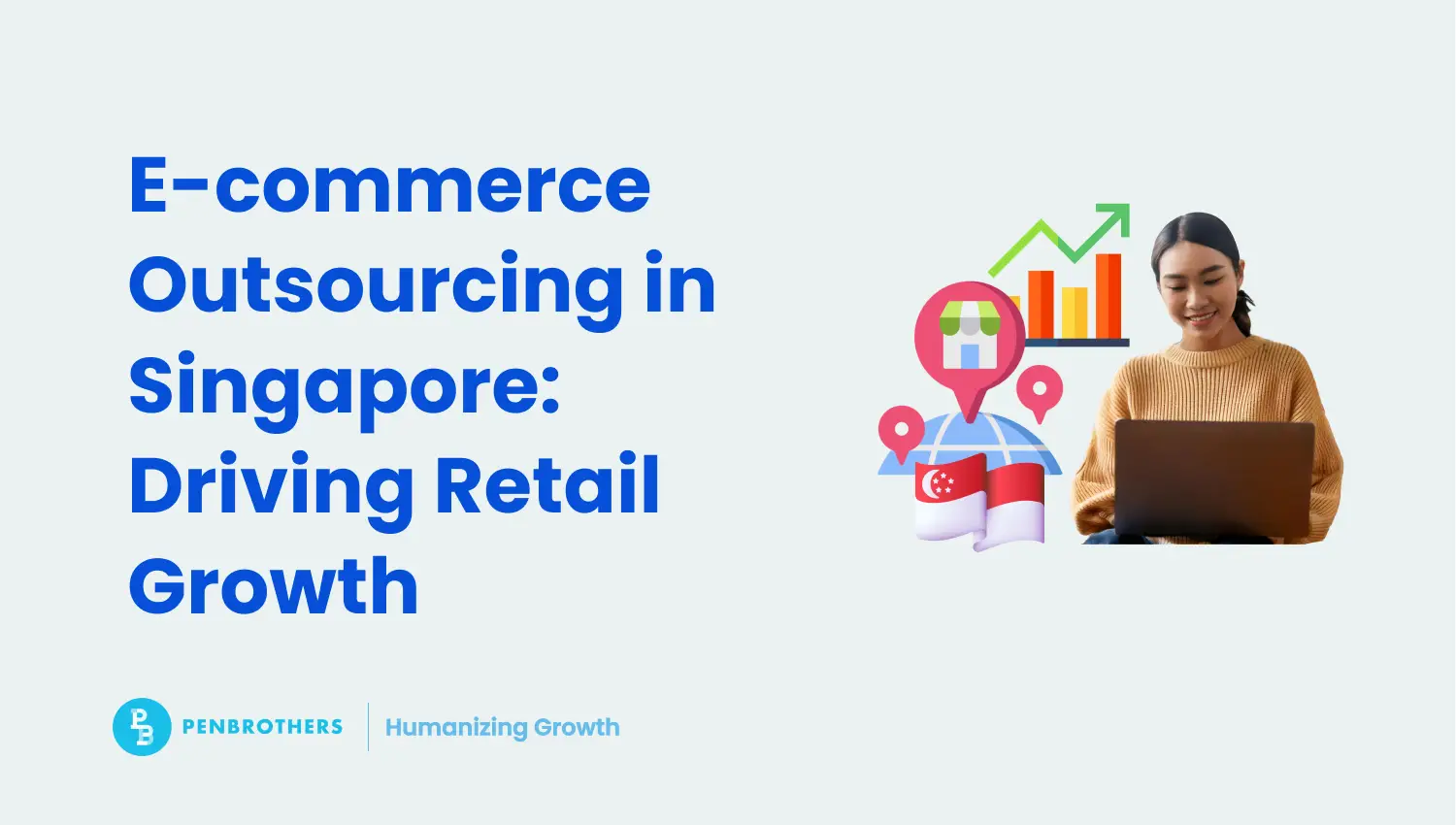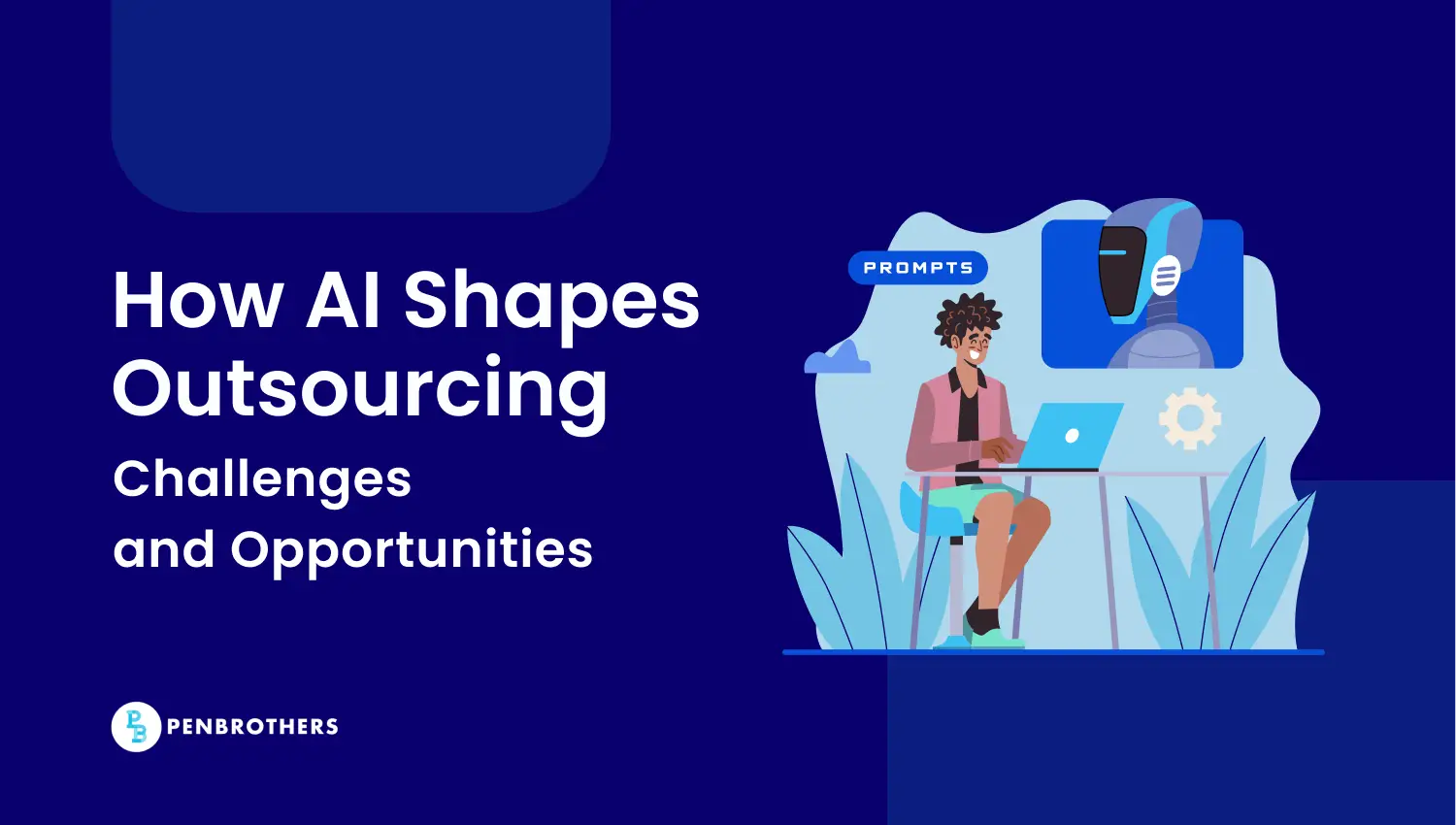What's Inside?
E-commerce Outsourcing Singapore: How Retailers Are Navigating Growth

With Singapore’s e-commerce market projected to reach US$8.4 billion by 2029, local retailers are under immense pressure to meet rising consumer demand. The pandemic accelerated digital adoption, pushing consumers towards online shopping for their daily needs, and reshaping the retail industry in the process. Retailers now face challenges ranging from operational inefficiencies to high customer expectations, all while navigating intense competition and evolving regulations.
Outsourcing has emerged as a strategic solution, enabling Singaporean retailers to stay agile, cost-efficient, and focused on growth. As highlighted in offshoring trends, businesses worldwide are increasingly leveraging outsourcing to stay competitive in evolving markets like Singapore.
The Unique Challenges Singaporean Retailers Face
- High Operational Costs
Operating a retail business in Singapore comes with high costs, including labor, warehousing, and logistics. The city-state’s premium real estate and wages make scaling in-house operations a financial burden, especially for small-to-medium businesses. Outsourcing roles to regions like the Philippines can significantly alleviate these economic pressures, as detailed in the benefits of offshore staffing, highlighting how companies can reduce costs while maintaining quality operations.
- Fast-Changing Consumer Preferences
Consumers in Singapore demand fast, personalized, and seamless shopping experiences. They expect 24/7 customer support, accurate inventory, and quick delivery. Failing to meet these expectations can lead to poor customer retention, a critical issue in today’s competitive market. According to eMarketer, businesses with superior customer service have notably higher retention rates, emphasizing the need for consistent and quality support.
- Intense Competition
Singapore’s position as a regional hub has attracted international players, increasing competition for both customers and market share. Retailers not only compete with regional giants like Lazada and Shopee but also global leaders like Amazon, further raising the bar for service quality and operational efficiency.
- Regulatory Complexities
E-commerce businesses must navigate complex regulatory landscapes, including import/export restrictions and stringent data privacy laws. These regulations require specialized knowledge and resources, adding an extra layer of operational challenges.
- Impact of Digital Transformation
The shift towards omnichannel retail and the integration of AI, data analytics, and automation tools have made operations more complex. While these technologies improve efficiency, they require significant investments in expertise and infrastructure, further straining resources.
Why Operational Excellence Matters in E-commerce
Operational excellence directly impacts a retailer’s customer experience, scalability, and profitability. In the highly competitive e-commerce landscape, inefficiencies can hinder growth and damage a brand’s reputation.
- Customer Experience
Consumers demand seamless experiences, from browsing products to receiving their orders. Operational failures like delayed deliveries, inaccurate stock information, or slow customer service can lead to dissatisfaction and churn. A Singapore Department of Statistics report noted that e-commerce revenue in the services sector reached S$401.1 billion in 2022, underscoring the growing demand retailers must manage efficiently.
- Scalability
Retailers without streamlined processes struggle to scale operations during peak periods. For instance, sales events like Singles’ Day or holiday seasons often expose weaknesses in logistics and customer support systems, leading to operational bottlenecks.
- Profitability
Inefficient operations inflate costs and erode margins. For example, relying on manual inventory management increases the risk of errors and stockouts, which can result in lost sales and dissatisfied customers.
Operational excellence ensures businesses not only meet customer expectations but also maintain profitability and growth in a demanding market.
Solutions to Address E-commerce Challenges
Outsourcing offers practical and scalable solutions to overcome operational challenges:
- Streamlining Operations
- Delegating logistics to specialized providers ensures faster deliveries, efficient returns management, and optimized inventory tracking.
- Outsourced customer support teams handle inquiries round-the-clock, reducing wait times and enhancing satisfaction.
- Adopting Technology
- Partnering with tech-enabled outsourcing providers helps integrate AI, automation, and data analytics, which improve accuracy and speed in logistics and customer service.
- Leveraging Global Talent
- Outsourcing to regions like the Philippines provides access to a skilled, cost-effective workforce adept in customer support, marketing, and IT services.
Roles Available in the Philippines and Cost Comparison
Here’s a list of e-commerce roles you can outsource to the Philippines, along with their cost comparison to in-house hires in Singapore:
E-Commerce Manager
Oversees the online sales strategy and operations of an e-commerce platform, ensuring seamless customer experiences, optimizing sales funnels, and driving revenue growth through data-driven decisions.
| Philippine Annual Salary: | SGD 32,900 |
| United States Annual Salary: | SGD 87,100 |
Ul/UX Designer
Designs user-friendly interfaces and experiences for websites, apps, and digital platforms by understanding user behavior, creating wireframes, and ensuring visually appealing and functional designs.
| Philippine Annual Salary: | SGD 30,500 |
| United States Annual Salary: | SGD 72,600 |
Product Manager
Manages the lifecycle of a product, from ideation to launch, by coordinating with cross-functional teams, setting priorities, and aligning product features with market demands and business objectives.
| Philippine Annual Salary: | SGD 29,800 |
| United States Annual Salary: | SGD 87,100 |
Logistics and Supply Chain Manager
Plans, implements, and oversees the movement and storage of goods, ensuring efficient supply chain operations, cost management, and timely delivery of products.
| Philippine Annual Salary: | SGD 40,100 |
| United States Annual Salary: | SGD 183,900 |
Content Creator
Develops engaging content across various formats, including text, video, and graphics, tailored to capture the audience’s attention and align with a brand’s messaging and marketing goals.
| Philippine Annual Salary: | SGD 25,400 |
| United States Annual Salary: | SGD 84,700 |
Fulfillment Coordinator
Manages the order fulfillment process by ensuring inventory accuracy, timely shipping, and seamless coordination with warehouses and carriers to meet customer expectations.
| Philippine Annual Salary: | SGD 23,700 |
| United States Annual Salary: | SGD 67,800 |
Shopify Specialist
Builds and customizes Shopify stores, manages integrations, and optimizes e-commerce functionalities to improve sales performance and provide an exceptional shopping experience.
| Philippine Annual Salary: | SGD 32,900 |
| United States Annual Salary: | SGD 96,800 |
Data Analyst
Collects and interprets e-commerce data to identify trends, optimize marketing strategies, and improve decision-making processes.
| Philippine Annual Salary: | SGD 28,800 |
| United States Annual Salary: | SGD 87,100 |
Social Media Manager
Plans and executes social media strategies, manages content calendars, and interacts with customers to boost brand engagement.
| Philippine Annual Salary: | SGD 21,300 |
| United States Annual Salary: | SGD 76,800 |
Digital Marketing Specialist
Develops and executes online marketing strategies across channels such as social media, email, SEO, and paid advertising to drive brand awareness, generate leads, and optimize campaign performance.
| Philippine Annual Salary: | SGD 21,100 |
| United States Annual Salary: | SGD 94,400 |
Penbrothers’ Success Story
How PS.Cafe Achieved 24/7 Customer Support and Saved 59% in Staffing Costs
PS.Cafe, a renowned hospitality brand with 12 locations in Singapore and two in Shanghai, faced challenges in scaling its workforce, managing high local hiring costs, and providing 24/7 customer support. These issues threatened their ability to expand efficiently while maintaining their high service standards.
Partnering with Penbrothers, PS.Cafe reduced staffing costs by 59%, from SGD 134,310 to SGD 55,578 annually, by outsourcing skilled reservation officers from the Philippines. Penbrothers also ensured seamless integration, customized 24/7 work schedules, and operational efficiency through on-the-ground support.
As a result, PS.Cafe scaled successfully, minimized disruptions, and maintained exceptional service while opening new branches. With Penbrothers’ strategic support, PS.Cafe is poised for continued growth in the competitive hospitality sector.
Why Outsourcing is a Strategic Move in Retailing
Outsourcing has become an indispensable tool for Singaporean retailers navigating the complexities of e-commerce. It provides the agility and efficiency needed to compete in a dynamic market, enabling businesses to focus on what matters most—growing their brand.
Are you ready to transform your e-commerce operations?
Discover how Penbrothers’ tailored outsourcing solutions can help you thrive in Singapore’s competitive retail landscape.
Contact us today to learn more.
*This article was crafted with the support of AI technology and refined by a human editor.





